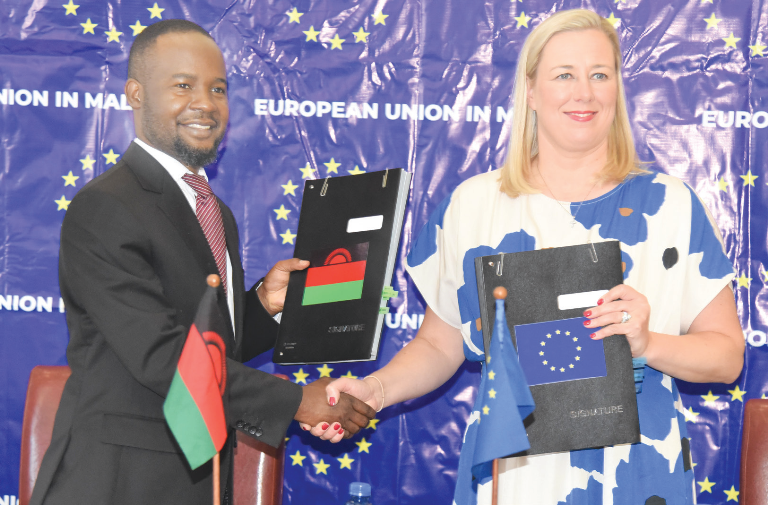EU hints at resuming budgetary support
European Union (EU) has hinted at the possibility of resuming budgetary support to Malawi, if the country keeps working on stabilising the economy and fulfils the eligibility criteria.
The EU commissioner for international partnerships Jutta Urpilainen said this in an interview on Friday after signing six financing agreements amounting to 125 million euro (approximately K129 billion) which will help Malawi uplift people’s livelihoods, especially at the grassroot level.

EU and other donors, under the Common Approach to Budget Support, stopped providing direct budgetary support to Malawi in September 2013. The development left a 40 percent hole in the recurrent budget and about 80 percent in the development budget, as the donors opted to channel resources through non-governmental organisations.
Urpilainen, who was in the country for a two-day visit, observed that budgetary support is based on clear eligibility criteria which must be followed.
She said: “In the past we provided budgetary support to Malawi but unfortunately, we stopped it because criteria were not followed. Now we know that the government is working hard to achieve an agreement with the International Monetary Fund [IMF] and also to stabilise the economic situation.
“That might pave the way to help the EU create an opportunity in the future to introduce budget support again. We are not there yet but I am optimistic following our discussions with the President and the minister of finance.”
On the six financing agreements that were signed, Minister of Finance and Economic Affairs Sosten Gwengwe said the funds will help Malawi to uplift people’s livelihoods, especially at the grassroot level.
He described the funds as a significant contribution to the Malawi economy through the bilateral agreement with the EU.
Said Gwengwe: “We launched the multi-annual indicative Programme (MIP) for Malawi 2021-2027 in March this year. The launch followed a successful programming exercise that was jointly done with the EU through their delegation office here in Malawi and was adopted by the European Commission in Brussels.
“The MIP for Malawi is aligned to both the Malawi 2063 and Malawi Implementation Plan (MIP) I as our main development blueprints. I am, therefore, excited that today we are gathered here again to jointly sign these Financing Agreements with Commissioner Jutta to kick-start implementation of the MIP for Malawi.”
The minister appealed to the implementing agents of the programmes to ensure that activities designed for these programmes are executed prudently, with speed, within the allocated budgets and timeframes.
“The programmes should meet the expectations of all Malawians and our partners. The government, through my ministry, will not tolerate any abuse or misuse of these scarce resources which are targeted towards achieving specific goals aimed at improving the livelihoods of all Malawians, especially turbulent times when our economy, just like any other economy in the world, is facing hardships due to global shocks and this support is very timely to mitigate the effects of such economic shocks,” he said.
On his part, EU Ambassador Rune Skinnebach said the European Commission has allocated 352 million euro (about K378 billion) to implement the multiannual indicative programme for the period between 2021-2027.
He said all the agreements signed will build on and learn from their joint experience with previous and ongoing programmes in the fields of governance, nutrition, and sustainable agriculture.
The six programmes are the Malawi Energy Programme allocated 10.5 million euro (about K11.2 billion); the greening and growing Malawi programme which has the biggest share of 56.5 million euro (about K60 billion); the access to justice and the democratic governance programmes which will each get 17 million euro (K18.2 billion).
Others are the food production and resilience of food systems programme which has been allocated 15 million euro (about K16 billion) and the technical cooperation facility programme which will get 9 million euro (K9.6 billion).
The new support of programmes is aimed at supporting green and resilient economic transformation in view of creating jobs based on sound democratic and economic governance systems.





